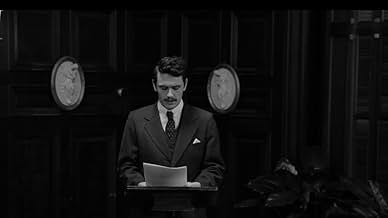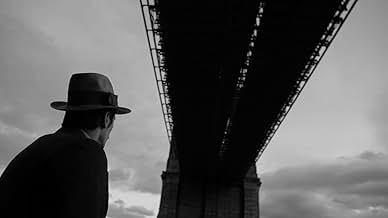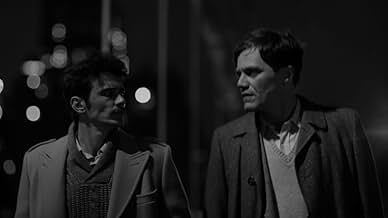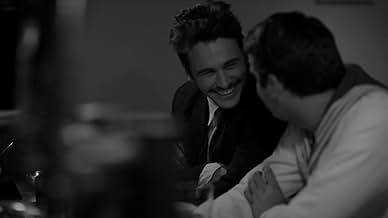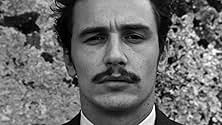A biography of American poet Hart Crane who committed suicide at the age of 32 by jumping off the steamship SS Orizaba.A biography of American poet Hart Crane who committed suicide at the age of 32 by jumping off the steamship SS Orizaba.A biography of American poet Hart Crane who committed suicide at the age of 32 by jumping off the steamship SS Orizaba.
- Director
- Writers
- All cast & crew
- Production, box office & more at IMDbPro
Featured reviews
A Brave Little Film that Finds a New Way of Communicating
The subject of the film is the life and creative genius of Hart Crane, (July 21, 1899 - April 27, 1932) an American poet who found both inspiration and provocation in the poetry of T. S. Eliot, Crane wrote modernist poetry that is difficult, highly stylized, and very ambitious in its scope. In his most ambitious work, The Bridge, Crane sought to write an epic poem in the vein of The Waste Land that expressed something more sincere and optimistic than the ironic despair that Crane found in Eliot's poetry. In the years following his suicide at the age of 32, Crane has come to be seen as one of the most influential poets of his generation.
James Franco wrote the screenplay based on book by Paul Mariani, directed and edited the film and acted the main role of Hart Crane. Crane was a nearly disconsolate man who refused to follow his wealthy father's business, longing instead to be a poet. Born in Ohio he traveled to New York (the place he always considered home), to Cuba, and to Paris searching for his poetic voice. He was a gay man in an era when his lifestyle was always under threat, he had a lover (Vince Jolivette) early on in an affair that was filled with passion, and in his travels he seemed to find his true love in Emile (Michael Shannon) that endured the manic highs and depressive, death-haunted lows that befell this self -destructive visionary poet. He attempted suicide at least once and finally ended his life in a successful suicide at the young age of 32.
Franco breathes life into Hart Crane, offering more understanding of this enigmatic genius than we have ever been afforded. In making the film Franco uses his younger brother Dave Franco to depict the young Hart and selects his small cast wisely. The film is completely in black and white and is in the format of 'Voyages' - each voyage takes us through a distinct part of Hart's life: his gay loves, his poetry readings, his forays to Cuba and to Paris and his lonely hours of sitting before an old typewriter where he created the major epics of poetry that remain some of the finest ever written by an American poet.
The film is choppy, not unlike the manner in which Hart's mind worked in bits and pieces, always immersed in thoughts of the sea, the labor of common man, of the Brooklyn Bridge which would play the major role in his most famous epic poem THE BRIDGE, and of the fellow artists whose work he so admired. There is a strange musical score (the work of Neil Benezra) which is long on choral chanting, and a quality of gritty cinematography achieved by Christiana Vorn. The technique of the making of this film matches the vision of James Franco in continuing to visit the lives of isolated geniuses. The dialogue, what little there is, is Crane's poetry as spoken by Franco.
For many this film will seem self-indulgent on Franco's part. And perhaps it partially is. But the flavor of this gay American poet of the 1920s and the reflections of America at that time ring true. THE BROKEN TOWER is not a biopic of Hart Crane. It is an elegy.
Grady Harp
A misfire
A drag
Valiant attempt to capture a problematical character
James Franco wrote and directed this movie, which comes across as an experimental film from a student still with much to learn. (Not knocking it, merely an observation, which is open to argument.) What the movie lacks most of all is an introduction to the many people whom Crane came into contact with during his life (from literary and social critic Waldo Frank - HUGE in his observations on American Society, to writer Malcolm Cowley and his painter-wife Peggy (Crane's only heterosexual love affair), painter Georgia O'Keefe and her husband Alfred Stieglitz, introducing Crane to Literary New York in the shape of Eugene O'Neill.) And other major influences in his life, Caresse and Harry Crosby (publishers of the Black Sun Press in Paris, who first brought recognition to William Burroughs, James Joyce etc, whose works were considered too obscene to be published in America.) WHERE is the scene where Harry Crosby (nephew of J.P. Morgan) considered the model for the Great Gatsby and the acknowledged epitome of drug-fueled extravagance and irresponsible behaviour in the 1920's, murders his mistress and kills himself while Hart is obliviously having dinner with Caresse? And what about Emil Opffer, Crane's one great love, for whom he wrote the suite of poems VOYAGES, which drop into the movie with flat readings, completely unbolstered by imaginative visuals? Nothing about Opffer's background, his family's flight from assassination in Denmark or Opffer's own experiences during World War 1. And what about Crane's mother's mental instability, her rejection of him for his homosexuality and threats to expose his sexual preferences to his father? And the meeting between Crane and Federico Garcia Lorca in 1929? Two doomed poets, both homosexual, totally unalike but both critical of American Society in the 1920's, although Crane's love for his country was absolute and eternal.
The Broken Tower does illustrate the difficulties of Crane's poetry, which in his own words is described as "A jazz roof garden method, evolved from a pseudo-symphonic construction, of an abstract beauty that has not been done before in the English language. A kind of metaphysical quotidian combination". (Wow!) At the time Crane's poetry was more appreciated outside of the United States than within. (The London Times: "Mr Crane reveals a profound originality in lines of arresting and luminous quality", whereas in the New York Saturday Review, "Mr. Crane rapes language under the impression he is paying it the highest compliment".) Poet Marianne Moore, who printed some of Crane's earliest poems, found them so impenetrable that she rewrote them without Crane's permission, an act of betrayal that devastated him.
What Crane was aiming for with his poetry was an Elizabethan accent on the American scene, drawn from the example of T.S. Eliot's The Waste Land, but rejecting Eliot's whole-hearted pessimism. Crane believed in America as the bridge to the future through mechanisation and he tried to infuse this in his poetry. What he ended up with was a mass of images that were so dense in their construction that the uninitiated reader would find them impossible to navigate. Crane believed in starting the journey for the reader, but forcing them to complete it on their own, which inevitably led to a great deal of frustration.
The Broken Tower is divided into various "Voyages", supposedly designed to illustrate the major events in Crane's life, drawing ever closer to his suicide. These are introduced by cue cards. For example "Hart Crane goes to Cuba" -- and we see him taking a long, long walk down a street somewhere. Or "Hart Crane goes to Mexico" -- and we see him singing in a bar with a Mexican guitarist. The pivotal moments in his life simply fail to materialize. While his alcoholism and poverty are well documented, and figure in the movie, so many other incidents are missing. The fact that he left America when the Great Depression hit, the fact that he was awarded a Guggenheim Fellowship that enabled him to live in Mexico during this period, but was threatened with withdrawal due to his erratic behaviour and public intoxication, is nowhere to be seen.
Another screenplay, entitled HART CRANE, written in 2008, can be found on www.simplyscripts.com and covers all the main incidents in Crane's life. Unfortunately, while it might be of interest to anyone seeking a fuller and more coherent version of Crane's life, it is unlikely ever to see the light of day due to the release of The Broken Tower.
Summing up, James Franco deserves kudos for having tackled such a difficult and uncommercial subject. Certainly an original interpretation of a problematical character, the chasms that exist between each "Voyage" and the lack of depth in the main character (due to the absence of any interaction with the main movers and shakers in his life) make it highly unlikely that this movie will have any lasting effect or figure in any revival. However, if this movie interests anyone enough to seek out Crane's poetry, then that is everything one can wish for -- and grateful thanks to James Franco for that.
A very artsy film
"The Broken Tower" is shot in black and white. It is a tell tale sign that it is a very artsy movie that has no commercial elements at all. I tried very hard to enjoy it, trying to appreciate the slowness of the pace, and trying to enjoy the beauty of the literature reading. However, there is really very little plot in the film, and the story is told in a very scattered manner. For every 30 seconds of plot, there are five minutes of self indulgent filler scenes. I got quite tired of watching James Franco walking around or sitting around. We also see a lot of Hart's sexual liaisons, ranging from walking up the stairs with another man, to apparently non-simulated oral sex.
After watching the whole film, I did not gain an insight into Hart's life, but rather it felt more like a project for James Franco to expose the exploration his sexuality.
Did you know
- TriviaShot in three countries and 30 locations in 15 days.
- GoofsThe dress, hair, and make-up of the Peggy character are all wrong for 1931.
- Quotes
Gorham Munson: Hart, forgive me for saying this. But you want to speak for America.
Hart Crane: Yeah.
Gorham Munson: Does it matter that you're queer?
Hart Crane: [Annoyed, rolls eyes] Whitman was queer. That's why he could love *all* of America. The roustabouts. The slaves. The, the soldiers he nursed in the Civil War.
Gorham Munson: So you will expose yourself?
Hart Crane: It's funny, considering my truckdriver left me. No. People can know everything about us when we're dead. But for now, it's better to keep quiet. For father's sake.
Gorham Munson: [sarcastically] Right. You wouldn't want to lose that tremendous job for the sake of some queer affirmation.
- ConnectionsReferenced in Hart Crane: An Exegesis (2012)
- How long is The Broken Tower?Powered by Alexa
Details
- Runtime
- 1h 39m(99 min)
- Color
- Aspect ratio
- 1.85 : 1


